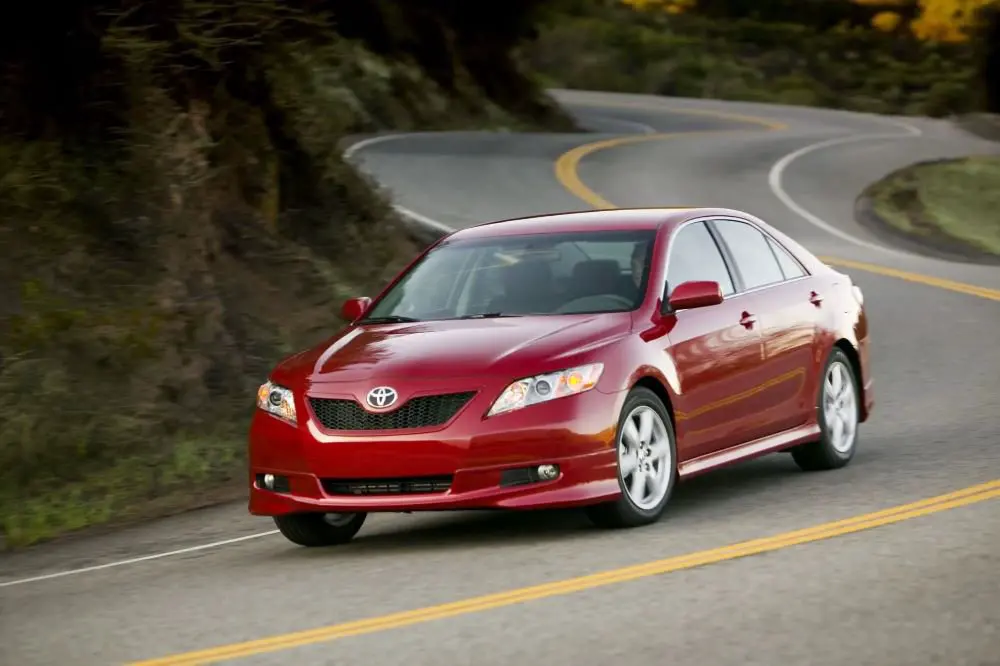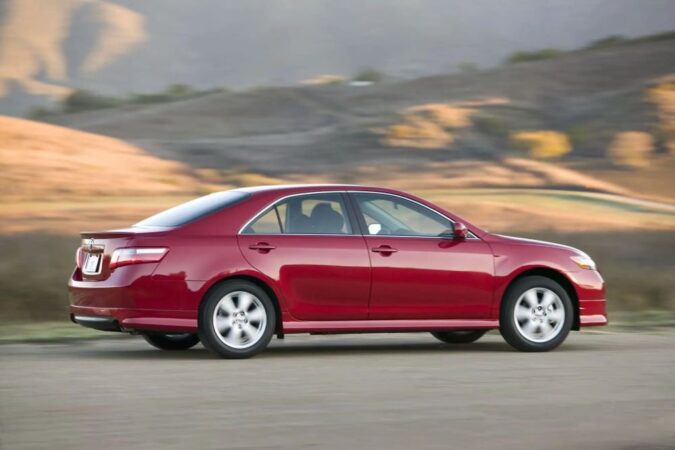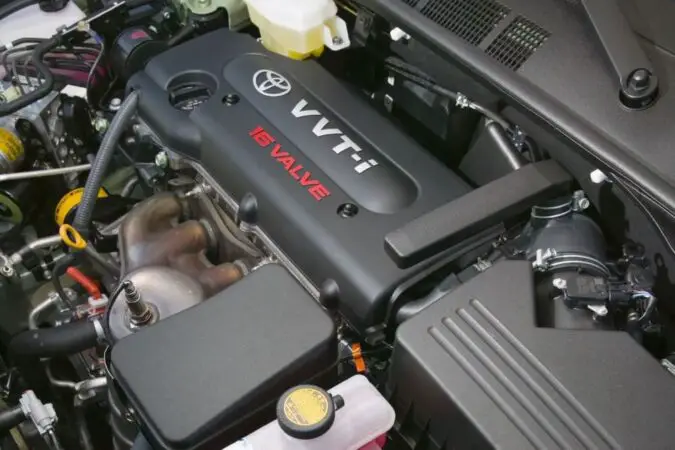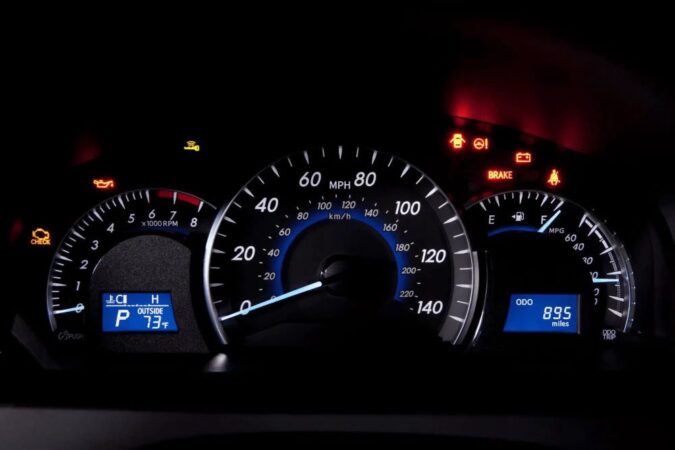Are you having trouble starting your Camry and the Toyota Camry cranks but won’t start? If this is the situation that you are in, then you are at the right place because we are going to cover everything you need to know when it comes to this no-start issue.
- Toyota Camry
- Why Won’t Your Car Start?
- Electrical-Related Causes
- Fuel-Related Causes
- Mechanical-Related Causes
- No Crank, No Start
- Repair Cost Estimates
- Final Conclusion
Having a problem like this can be extremely frustrating. Imagine that you have to go to work, you hop in your Camry and the car simply doesn’t want to start, although it cranks a lot. A strange situation I must admit. And then you are late for work, your boss is furious at you because you were late. Not an ideal start to the day.
That’s why you need to be prepared to tackle these issues. You always have to have a Plan B for everything in life. Something like a second car. Or to predict these problems before they even happen in the first place. And I must admit that this is the best solution out there that you can do to save some nerves and time. And we are going to help you out with that by teaching you all the possible reasons why this is happening.
First, we are going to learn what is the Camry and learn some of the basics of this model, then we will elaborate on the no-start problem and then we will discuss the reasons why the Toyota Camry cranks but won’t start. Later we will also see why it could not crank at all and the costs involving this problem. So, follow along.
Toyota Camry
Before we learn why the Toyota Camry cranks but won’t start problem happens. Let’s first familiarize ourselves with the Camry in general since not all here are car experts and know every bit of info. If you want you can skip on this part and move on to understanding the problem of Toyota Camry cranks but won’t start.
So, what is the Camry? The Toyota Camry is one of the most legendary Toyota products sold worldwide. But it is easily one of the most popular cars here in the states and attributed to the most sales Toyota makes. The Camry gets about 400,000 sales per year, only in the US. So, you can imagine how popular this car is.
Nevertheless, the Camry is a 4-door sedan. Meaning that it resembles a classic car shape. Not something like an SUV or a crossover.
The Camry is a mid-size car that is relatively large. It is in the same class as the Honda Accord, Hyundai Sonata, Kia K5, and the Subaru Legacy. There are more competitors to the Camry, but it will take us ages to list them all.
At the moment the Camry is in its eighth generation. The present model was introduced in 2017 and it is relatively old. Even though Toyota is updating it pretty regularly. If you have the Toyota Camry cranks but won’t start problem, then you probably are having one of the older models since newer cars do not have any bigger issues running.
The main problems like the Toyota Camry Cranks but won’t start usually appear after 7 or more years of age when the components get old and start to show their downsides. But more on that in the following chapters where we will elaborate on this problem in depth.
Car Cranks But Won’t Start
Now we are familiarized with the Camry and we can move on to discuss the no start problem. There are in fact two no-start situations that you could possibly come across.
One of these situations is when the car doesn’t want to crank at all and doesn’t want to start. While the second situation is when the Toyota Camry cranks but won’t start.
In order to keep things simple, we will focus primarily on the problem with the Toyota Camry Cranks but won’t start problem since this article is all about this issue when the car cranks but doesn’t want to start. Later on, we will see also the situations when the car doesn’t want to start but doesn’t crank. So, if you want to learn more about how to fix your Camry, follow along.
Why Is My Car Cranking But Not Starting
Now let’s move on to solving the Toyota Camry cranks but won’t start problem. In the following chapters, we are going to elaborate on all of the different reasons why this happens.
There are basically three focus points. These are the electrical problems that could cause this problem like things with ignition and sensors. Then there are the fuel-related ones.
These reasons often concern the fuel delivery system. And the last thing that we are going to discuss is mechanical damage and whether can mechanical damage cause the Toyota Camry cranks but won’t start problems to happen.
Electrical Problems
Now let’s start with electrical problems. Note that these do not have any connection to the electrical system but they do have with the delivery of power to the cylinders. There are a ton of things that could go wrong with the ignition and make the Toyota Camry cranks but won’t start problem and in the following few chapters, we are going to discuss these possibilities in depth. So, follow along.
Toyota Camry Cranks But Won’t Start, Causes #1. Weak Or Damaged Lead Acid Battery
The first thing that could possibly cause the Toyota Camry cranks but won’t start problem is a weak or damaged battery. As you know, cars need to have enough electrical current to start.
The average voltage to start an engine is 12V. The usual lead-acid battery in your car has six cells and each of these cells needs to have 2V of power. But what is bad is that these cells tend to fail. And when a cell fails, your battery power gets diminished.
Let’s say that there is one dead cell, meaning that you have 10V of cranking power. Which is not enough for some engines. This lack of power will make the Toyota Camry cranks but won’t start to happen.
So, how you can diagnose a bad car battery? The only way is to get a multimeter and check the voltage that the battery is producing. The voltage of a good battery should be 12V.
If the voltage of your battery is too low. This means that the battery is weak and this is making the Toyota Camry cranks but won’t start problem.
The solution for this problem would probably be a completely new battery. Just go to your local Autozone and get a new battery. It will not cost you more than $100. With this new battery, you will be good for at least 4 years. Also, make sure that you get a good battery from a reputable brand and not the cheapest that you can get. Now let’s move on to the next possibility.
Toyota Camry Cranks But Won’t Start, Causes #2. Bad Starter Motor
The second possibility for the Toyota Camry cranks but won’t start problem is probably the starter motor. But what is the starter motor?
Well, the starter motor is the one that is in charge of turning over the engine and initiating the combustion process in the first place. This is an electric motor that basically turns over the engine.
This starter motor unfortunately can fail and when the starter motor fails, you will face a Toyota Camry cranks but won’t start problem. So, why is this the case?
Well, this is the case because the starter motor is turning over slowly. This is not enough for the car to start. When this happens and the starter motor is damaged, you can also notice a grinding noise that is coming from the starter motor or whirring noise.
The starter motor will basically have a hard time starting the car. In this case, the only thing you could do is to take your car to a mechanic and have this starter motor checked. If needed, a proper replacement needs to be purchased. And starter motors are not that cheap after all.
Fixing this problem could cost you more than $500. So, when the Toyota Camry cranks but won’t start this is one of the options that you need to take a look at and investigate. Now, let’s move on to the next possibility.
Toyota Camry Cranks But Won’t Start, Causes #3. Bad Ignition Coil
The third most probable reason for the Toyota Camry cranks but won’t start is the possible bad engine coil.
As you know, modern cars are all computerized and have computerized ignition. Instead of cables like old carburetted cars ran, modern engines have ignition coils.
On each of the cylinders, there is a single coil that gets plugged into the spark plug. So, these coils are in charge of delivering electricity to the spark plug.
Sadly though, these coils are also prone to failure. They don’t fail all the time but know to fail more often as the car gets older. Whenever a coil has failed or is removed from the engine the Toyota Camry cranks but won’t start will happen and ruin your day.
What is worse is that you will need an OBD2 scanner tool to scan the car for codes and diagnose the bad coil. This tool connects directly to the OBD2 port and finds all of the errors that the ECU is producing. If there are errors on a specific coil, it means that you will have to replace the coil with a new one. They are costly though, a single coil can cost from $150 to $250. Now let’s move on to the next reason for the Toyota Camry cranks but won’t start.
Toyota Camry Cranks But Won’t Start, Causes #4. Bad Spark Plugs
Bad spark plugs can also cause the Toyota Camry cranks but won’t start problem to appear. As you know, spark plugs are components that have a lifespan and this lifespan can be destroyed if there is a problem in the engine like burning oil. Something that is common on these engines that Toyota has.
So, it is a good idea to check the spark plugs and replace them. They are dirt cheap and you could replace all of them for less than $100. If you do it by yourself it will be even cheaper. Now let’s move on to the next reason why Toyota Camry cranks but won’t start.
Toyota Camry Cranks But Won’t Start, Causes #5. Bad Crankshaft Position Sensor
Another thing that can cause the Toyota Camry cranks but won’t start is the bad crankshaft position sensor. This sensor is very important and means a lot if your car is able to run or not.
This sensor is basically observing the position of the crankshaft. This means that when this sensor is not working properly, the car will continuously crank and not start. Sometimes the car will start but this will happen after persistent cranking. And that is something you don’t want to do because you can kill the battery in the process.
This problem is also diagnosed with an OBD2 scanner and it is the only way you can diagnose a bad sensor. Except if you have a good sensor and test the car with the good one. Overall, an expensive sensor, it could easily cost you about $500 to replace it and solve the Toyota Camry cranks but won’t start problem.
Fuel System Problems
Now let’s discuss the fuel-related issues that can cause this problem of Toyota Camry cranks but won’t start.
It is worth mentioning that there are a few options when it comes to this problem and some of them are expensive to fix. So, what are the possibilities? Let’s elaborate.
Toyota Camry Cranks But Won’t Start, Causes #6. No Gas In The Fuel Tank
The first and most obvious reason for the Toyota Camry cranks but won’t start is the lack of fuel inside of the fuel tank. This is a silly reason. But it happens to a lot of people, especially ones who forgot when was the last time they poured fuel into the car. The solution will require pouring fresh fuel into it and calling it a day. Now let’s move on to the next.
Toyota Camry Cranks But Won’t Start, Causes #7. Clogged Fuel Filter
A clogged fuel filter can also cause the Toyota Camry cranks but won’t start problem. This often happens in a car that has a clogged fuel filter that is obstructing the fuel from passing and entering the combustion chamber.
The solution to this problem would require replacing the fuel filter. So, if you can’t remember when was the last time you replaced your fuel filter, it is better to replace it soon. Now let’s move on to the next probable cause for Toyota Camry cranks but won’t start.
Toyota Camry Cranks But Won’t Start, Causes #8. Bad Fuel Pump
Another probable reason for the Toyota Camry cranks but won’t start is a dead fuel pump. As you know, there is a pump inside of the fuel tank that is pumping fuel into the engine.
Whenever you put the key in the ignition and turn the key slightly, you should hear a clicking sound from the trunk. This means that the fuel pump is engaging. So, this is good. If you don’t hear anything, then this is not a good sign and it means that your fuel pump has probably failed. This problem is also diagnosed with an OBD2 scanner since the pump is regulated by the ECU. An expensive fix I must admit. Now let’s move on to the next.
Mechanical Problems
The last type of reason that we are going to cover when it comes to the Toyota Camry won’t start problem is the mechanical damage. This is the worst thing that could happen to you and in the following chapter, we are going to elaborate on the problem.
Toyota Camry Cranks But Won’t Start, Causes #9. No Compression In The Engine
The last reason that we are going to cover is a lack of compression. A lack of compression will severely impair your engine and the Toyota Camry cranks but won’t start will probably be one of the first symptoms. So, why is this the case?
This is the case because the engine doesn’t have enough compression to build to work properly. This lack of compression means that there is a blowby where this blowby shouldn’t exist like the cylinder heads, cylinders, and rod bearings. This phase is the terminal phase of an engine. Unless the head is the one that is affected.
In case only the head is affected you will only do a valve job and the engine will be fine. If not, you are probably going to need a completely new engine.
That’s why measuring the compression in your engine to see if this is causing the Toyota Camry cranks but won’t start problem. If this is the case, then the engine has to be disassembled into bits and see if something can be done to it. If not, a new engine will be necessary.
Toyota Camry Cranks But Won’t Start, Causes #10. Faulty Fuel Injectors
Fuel injectors play a crucial role by spraying the precise amount of gasoline into the combustion chamber. However, they can malfunction over time due to wear or clogs. When they don’t work properly, the correct fuel-air mixture can’t be maintained. Thus, even if your Camry cranks, it might not start.
You can listen for a clicking sound when the key is turned to verify the injector’s function. A mechanic will often use a noid light to further diagnose a faulty injector. Replacement or cleaning might be necessary, which, depending on the severity, can set you back a bit.
Toyota Camry Cranks But Won’t Start, Causes #11. Faulty Ignition Switch
The ignition switch starts the starter motor. Over time, this switch can wear out, leading to electrical problems. If the switch doesn’t send the correct signals to the components required to start the engine, your Camry might crank but not ignite.
One way to spot a faulty ignition switch is if the dashboard lights flicker or don’t light up when you try starting the car. Consultation with a mechanic is advised, and replacement parts can vary in price.
Toyota Camry Cranks But Won’t Start, Causes #12. Faulty Camshaft Position Sensor
Like the crankshaft position sensor, the camshaft position sensor is vital for engine function. It helps regulate the injection of fuel and the ignition of the spark plugs. If this sensor fails, it can prevent the engine from starting.
This issue can also be diagnosed using an OBD2 scanner. A malfunctioning camshaft position sensor might trigger an error code. Replacing this sensor can be moderately expensive but essential to get your car running smoothly again.
Toyota Camry Cranks But Won’t Start, Causes #13. Damaged Timing Belt
The timing belt ensures the engine’s valves open and close at the right time. If it’s damaged or broken, the engine might not start. While inspecting, look for signs of wear like cracks or missing teeth.
It’s wise to replace a timing belt every 60,000 to 100,000 miles. Waiting too long can lead to engine damage. Depending on labor costs and location, replacing a timing belt can be pricey, but it’s critical for the engine’s health.
Toyota Camry Cranks But Won’t Start, Causes #14. Immobilizer System Issue
Modern Toyota Camrys are equipped with an immobilizer system. It’s an anti-theft feature that recognizes the car key. If there’s a malfunction or it fails to recognize the key, it will prevent the car from starting.
In such cases, you might see an immobilizer light on the dashboard. If it’s a key issue, getting a new one might solve the problem. For system malfunctions, professional assistance will be necessary.
Toyota Camry Cranks But Won’t Start, Causes #15. Water in the Fuel
Water in the fuel can prevent an engine from starting. This might happen if you’ve filled up at a gas station with contaminated fuel or due to condensation in the fuel tank. Water prevents combustion, causing the engine to crank without starting.
The solution might be to empty the fuel tank and fill it up with fresh gas. It’s also recommended to add a fuel additive to dispel any remaining moisture.
In conclusion, a myriad of issues can lead to a “cranks but won’t start” situation. From components wearing out due to age to system malfunctions, each cause requires a specific solution. Regular maintenance can preempt many of these issues, ensuring your Camry runs smoothly for years to come.
No Crank No Start
We learned the probable reasons for the Toyota Camry cranks but won’t start. Now let’s see if it doesn’t crank. This is also a very common thing that could piss off a lot of Camry owners. We will go briefly through the problems since this article is about a different scenario. But if you have this type of situation, this might be extremely useful for you.
The most probable cause for no crank at all is a bad key fob battery (and you need to figure out changing batteries in the key fob). This is the case because the battery powers the transponder inside of the key. So, if there is no power, the car will not recognize the key.
The second probable thing is a bad starter solenoid. This solenoid is on top of the starter motor and drives the electric current to the motor. This component is known to fail and cause a click-click sound.
The third most probable reason is corroded battery cables or a completely dead battery. These things are extremely common and tend to happen. The lead-acid battery could simply fail and prevent the car from starting.
In addition to this, problems with the ECU are also common. Also if a coil or other component is removed from the engine and in the worst case if the engine is hydro locked. Meaning that the car engine sucked water.
Overall, these are the issues that can cause the no-crank problem. But what are the Toyota Camry cranks but won’t start to cost to fix this problem? That’s what we are going to cover next.
How Much To Fix A Car That Won’t Start
So, we covered the Toyota Camry cranks but won’t start. Now let’s see how much it will cost you to fix this problem in the first place. How expensive is it to fix some of these issues? Let’s elaborate.
We will start from the simplest things and that is the battery and spark plugs. A good new battery is not that expensive and you could fix it for $100. Also if the spark plugs are bad, then the fix will be about $70 to replace all of them.
The fuel filter is also cheap and will cost you no more than $100 to replace. And here we come to the more expensive stuff.
Let’s say that you need a new starter motor. This will cost you about $500 or more in some cases. A new fuel pump is also between $500 and $1,000 depending on the pump. Ignition coils are between $150 and $250. For more insight, check out our guide on the Honda Accord starter replacement cost.
And the most expensive repair is if you need to perform an engine overhaul. This might cost you between $1,500 to $2,500. Or if you get a new used engine that could be more than $2,500 as well. Overall, these are the average prices for fixing the Toyota Camry cranks but won’t start.
Toyota Camry: Reasons Why It Won’t Start – Facts
- Toyota Camry is a reliable car but there are times when it may not start due to several reasons.
- The top five reasons why a Toyota Camry may not start are a dead battery, a defective alternator, a broken ignition switch, a clogged fuel filter, or an empty gas tank.
- Before assuming the worst, check the battery first. If the battery is dead, try jump-starting it.
- If you hear a “click, click, click” sound when trying to start the engine, the starter could be to blame.
- If the car takes two to three times to start up properly, you may need to replace the ignition switch.
- If all else fails, check the fuel filter as a clogged fuel filter can cause the car not to start.
- Clogged fuel filters can occur over time, especially in older Toyota Camry models.
- You can get the fuel filter replaced by a qualified mechanic or do it yourself if you’re mechanically inclined.
- Toyota Camrys are still highly reliable cars, but they have minor issues like any other car.
- If you experience any of these issues and cannot solve them on your own, it may be necessary to take the car to a mechanic.
Toyota Camry Cranks But Won’t Start: In Conclusion…
In this article, we have covered quite a bit when it comes to the Toyota Camry cranks but won’t start problem. First, we familiarized ourselves with the Camry and learned what this model is all about.
Then we covered the problem of Toyota Camry cranks but won’t start. There are three major causes, ignition-related, fuel-delivery-related, and mechanical problems. The worst of the bunch are the mechanical problems. As we noted in the costs chapter a new engine will cost you more than $2,500 to replace the old one.
That’s why you better hope that it’s something else like the spark plugs and ignition coils and not something serious like the engine compression.




